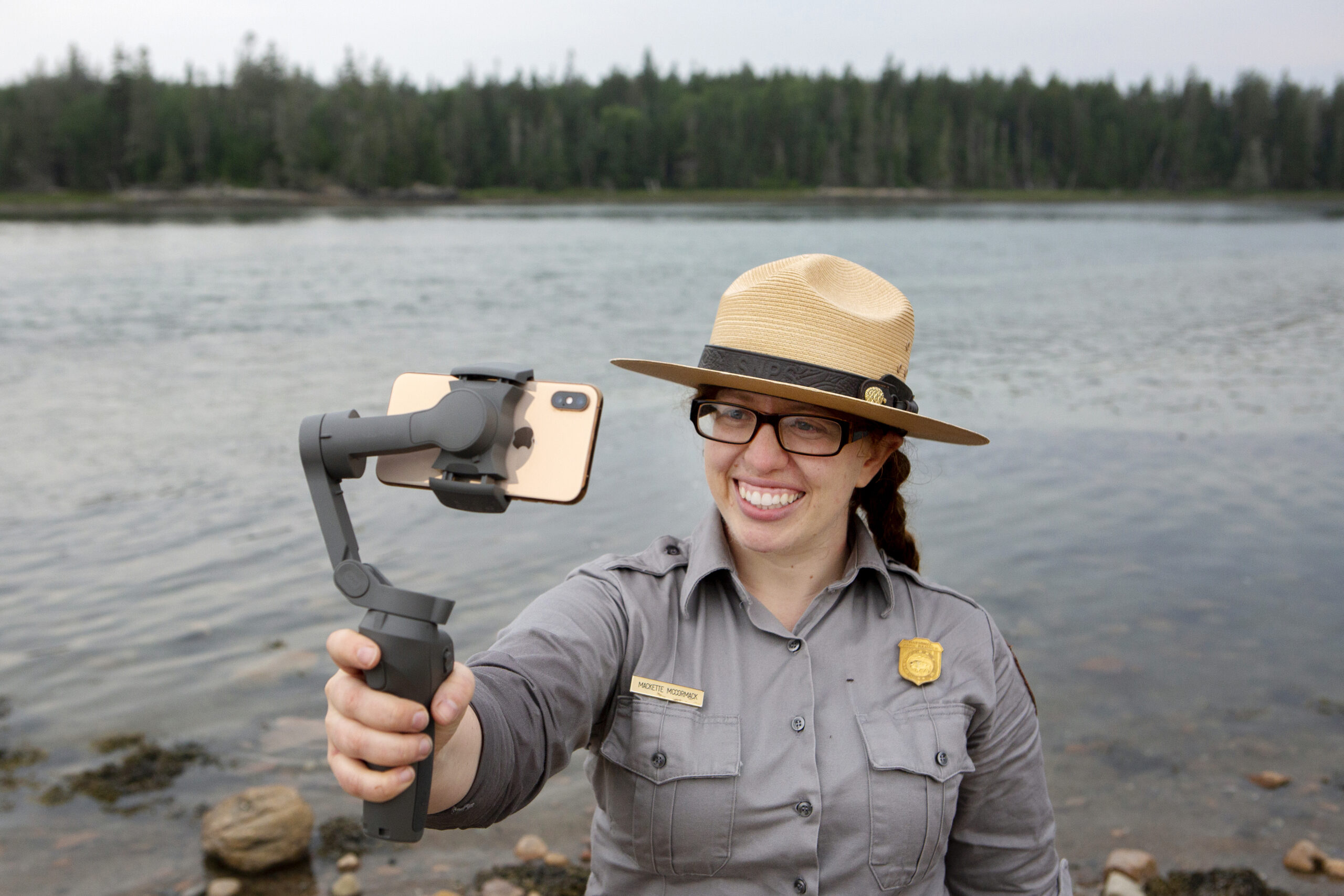Friends of Acadia is Helping to Improve Remote Learning for Students by Supporting Acadia National Park’s Education Rangers
March 11th, 2021
March 11th, 2021
BY PAIGE STEELE
One of the bright spots during the education crisis created by the pandemic is the increased collaboration between school communities and outside educational partners to find innovative solutions. They have come together to ask: “How can I help?,” “Who needs help?,” and “Ah, I need help!”
Friends of Acadia is helping to improve remote learning for students by supporting Acadia National Park’s education rangers, who are a dynamic and effective partner to schools in Maine and beyond.
Students around the state and the country are being energized with virtual rays of sunshine when they tune in for live, interactive, nature-based programs with an education ranger. The park’s staff have become a well-oiled machine of virtual programming, delivering 421 online field trips to 6,719 students and 580 adults since late September, with 275 more programs expected for the spring semester.
Rangers piloted 33 new programs, either with new content— such as winter ecology for kindergarten through 8th grade—or modified content from a field program like “Sedimentary Sleuths” normally held in person at Sand Beach. And exciting new content was created for younger kids in pre-K through 2nd grades, as the park had few lesson plans for this age group pre-pandemic.
Kate Petrie, Acadia National Park’s education coordinator, said her team achieved this feat because of Friends of Acadia’s support. “Friends of Acadia funded staff to develop, train, and present these virtual programs, and the schools need it. This will never be a full substitute for in-person experiences in the park, but we have jumped in to be as useful to teachers as we can be right now.”
In addition to direct support of seasonal education staff, Friends of Acadia is helping the park created virtual lesson plans that will last beyond the pandemic. A Friends of Acadia seasonal staff member and the park team created a series titled, “I Notice, I Wonder,” featuring short video clips of Acadia’s wildlife.
In this series, students view nature videos and learn to make observations and compose questions. For example, they may watch a sea star in a tidepool and then discuss with their classmates “How does it breathe?” and “What does it eat?” When school groups return in person to Acadia, online content like this will amplify the learning experience, pre-and post-field trip.

Acadia National Park Acting Administrative Assistant Mackette Kark films an educational video about tide pools at Ship Harbor. The video is being used for the 2020 Friends of Acadia Benefit Paddle Raise, which is raising money to provide technology kits to help rangers provide distance learning for students and the general public. (Photo by Ashley L. Conti/Friends of Acadia)
Park educators are also infusing social and emotional learning throughout virtual programming as much as possible, because kids are desperate for that type of interaction during the pandemic. Most kids are naturally social, but for over a year they have been isolated and disconnected from family, friends, schools, and even playgrounds.
Mount Desert Island schools requested that rangers meet weekly with a small group of kindergarten through 5th grade students. Park staff have hosted 16 of these programs so far with 96 students, and another 14 sessions are booked for the spring. The program was designed to help little learners grow by creating, then sharing their work with park rangers, such as an animal they drew or poem they wrote. Remote learning has also been enhanced with field experience through self-guided educational hikes for families and nature study kits that were distributed to local kindergarten through 8th grade students.
In addition to programming for teachers and schools, education rangers also piloted 54 virtual public programs during this time, reaching 580 homeschool students and members of the public on topics such as marine chemistry and feathered friends. Participants ranged from young, home-schooled children with their parents to elderly couples interested in park offerings.
To achieve this incredible volume of virtual programming, the park team trained each other on timing, themes, props, and more so they could envision how a program would be viewed at home or in the classroom. They also trained thoroughly on all technical logistics to aid teachers no matter their skill levels with computers or digital platforms.
Alongside program production, the park was updating and expanding digital media equipment and hiring a Visual Information Specialist thanks to more than $300,000 raised at the Friends of Acadia Benefit for the Acadia Resiliency Fund. These funds are increasing program capacity and ensuring high-quality virtual programs at Acadia.
The support of education rangers by Friends of Acadia cannot be overstated in its value to school communities this year, especially in Maine. Thank you to the superhero teachers for stewarding our children. Thank you to Friends of Acadia members for supporting impactful partnerships. And thank you to the incredible education staff at Acadia National Park who are supporting schools every day by sending out learning lifelines and virtual sunshine.
PAIGE STEELE is Conservation Projects Manager at Friends of Acadia